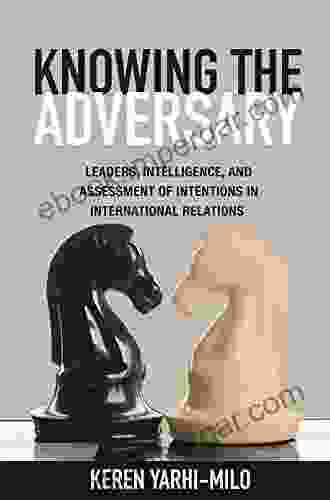Leaders' Intelligence and Assessment of Intentions in International Relations

4.3 out of 5
| Language | : | English |
| File size | : | 1857 KB |
| Text-to-Speech | : | Enabled |
| Screen Reader | : | Supported |
| Enhanced typesetting | : | Enabled |
| Word Wise | : | Enabled |
| Print length | : | 362 pages |
In the complex and ever-changing world of international relations, leaders are constantly faced with the challenge of assessing the intentions of other states. This is a difficult task, as intentions are often hidden or ambiguous. However, the ability to accurately assess intentions is essential for making sound foreign policy decisions.
There are a number of factors that can influence a leader's assessment of intentions. These include the leader's own cognitive processes, the impact of biases and emotions, and the availability of information.
Cognitive Processes
The cognitive processes involved in assessing intentions are complex. Leaders must first gather and interpret information about the other state's behavior. They then need to make inferences about the state's goals, motivations, and likely future actions. This process is often difficult, as it requires leaders to make judgments about the intentions of others based on limited and often ambiguous information.
There are a number of cognitive biases that can influence a leader's assessment of intentions. These biases include the confirmation bias, the availability heuristic, and the hindsight bias. The confirmation bias is the tendency to seek out and interpret information that confirms our existing beliefs. The availability heuristic is the tendency to judge the likelihood of an event based on how easily we can recall examples of that event. The hindsight bias is the tendency to believe that we could have predicted an event after it has already happened.
These biases can lead leaders to make inaccurate assessments of intentions. For example, a leader who is biased towards believing that another state is hostile may be more likely to interpret ambiguous behavior as evidence of hostility. Similarly, a leader who is biased towards believing that another state is friendly may be more likely to overlook evidence of hostility.
Impact of Biases and Emotions
Biases and emotions can also influence a leader's assessment of intentions. Leaders who are feeling anxious or threatened are more likely to perceive threats. Similarly, leaders who are feeling confident and optimistic are more likely to perceive opportunities. These emotional biases can lead leaders to make inaccurate assessments of intentions and to make poor foreign policy decisions.
Availability of Information
The availability of information can also influence a leader's assessment of intentions. Leaders who have access to more information about the other state's behavior are more likely to make accurate assessments of intentions. However, even when leaders have access to a lot of information, it can be difficult to determine which information is accurate and relevant. This is especially true in the context of international relations, where states often try to deceive and mislead each other.
Implications for Foreign Policy Decision-Making
The ability to accurately assess intentions is essential for making sound foreign policy decisions. Leaders who make inaccurate assessments of intentions are more likely to make decisions that are based on fear and distrust. This can lead to conflict and war. Conversely, leaders who are able to accurately assess intentions are more likely to make decisions that are based on cooperation and trust. This can lead to peace and stability.
There are a number of things that leaders can do to improve their ability to assess intentions. These include:
- Being aware of their own cognitive biases
- Seeking out information that challenges their existing beliefs
- Consulting with experts on the region or issue
- Taking the time to consider all of the evidence before making a judgment
By following these steps, leaders can improve their ability to assess intentions and make better foreign policy decisions.
The ability to accurately assess intentions is essential for leaders in the field of international relations. Leaders who make inaccurate assessments of intentions are more likely to make decisions that are based on fear and distrust. This can lead to conflict and war. Conversely, leaders who are able to accurately assess intentions are more likely to make decisions that are based on cooperation and trust. This can lead to peace and stability.
4.3 out of 5
| Language | : | English |
| File size | : | 1857 KB |
| Text-to-Speech | : | Enabled |
| Screen Reader | : | Supported |
| Enhanced typesetting | : | Enabled |
| Word Wise | : | Enabled |
| Print length | : | 362 pages |
Do you want to contribute by writing guest posts on this blog?
Please contact us and send us a resume of previous articles that you have written.
 Book
Book Novel
Novel Page
Page Chapter
Chapter Text
Text Story
Story Genre
Genre Reader
Reader Library
Library Paperback
Paperback E-book
E-book Magazine
Magazine Newspaper
Newspaper Paragraph
Paragraph Sentence
Sentence Bookmark
Bookmark Shelf
Shelf Glossary
Glossary Bibliography
Bibliography Foreword
Foreword Preface
Preface Synopsis
Synopsis Annotation
Annotation Footnote
Footnote Manuscript
Manuscript Scroll
Scroll Codex
Codex Tome
Tome Bestseller
Bestseller Classics
Classics Library card
Library card Narrative
Narrative Biography
Biography Autobiography
Autobiography Memoir
Memoir Reference
Reference Encyclopedia
Encyclopedia Kevin F Mcmurray
Kevin F Mcmurray Kevin Pharris
Kevin Pharris Kim Holman Bell
Kim Holman Bell Kenneth W Merrell
Kenneth W Merrell Kenny Rogers
Kenny Rogers Kenichiro Sugitani
Kenichiro Sugitani Kevin M Bailey
Kevin M Bailey Kieko Matteson
Kieko Matteson Kerry A Trask
Kerry A Trask Khalid Rehman Hakeem
Khalid Rehman Hakeem Kim Zimmer
Kim Zimmer Kenneth N Condrell
Kenneth N Condrell Kevin Dockery
Kevin Dockery Keng C Wu
Keng C Wu Kevin Baker
Kevin Baker Kent Annan
Kent Annan Kevin Kniery
Kevin Kniery Kevin Williamson
Kevin Williamson Kenji Yoshino
Kenji Yoshino Kendra Langeteig
Kendra Langeteig
Light bulbAdvertise smarter! Our strategic ad space ensures maximum exposure. Reserve your spot today!

 Fernando PessoaThe Day Training Pocket Manual 1944: Your Guide to Unleashing the Power of...
Fernando PessoaThe Day Training Pocket Manual 1944: Your Guide to Unleashing the Power of...
 Daniel KnightDictionary for Navigating the Jungle of Corporate Speak: Your Concise Guide...
Daniel KnightDictionary for Navigating the Jungle of Corporate Speak: Your Concise Guide... Gary ReedFollow ·7.4k
Gary ReedFollow ·7.4k Raymond ParkerFollow ·6.2k
Raymond ParkerFollow ·6.2k Rudyard KiplingFollow ·10.1k
Rudyard KiplingFollow ·10.1k John UpdikeFollow ·16.4k
John UpdikeFollow ·16.4k Edward ReedFollow ·8.3k
Edward ReedFollow ·8.3k Robert ReedFollow ·5.9k
Robert ReedFollow ·5.9k Ivan CoxFollow ·8.8k
Ivan CoxFollow ·8.8k E.M. ForsterFollow ·18.6k
E.M. ForsterFollow ·18.6k

 Chadwick Powell
Chadwick PowellDiscover the Secrets of Optimal Health with "The Healthy...
Preface: Embark on a Transformative...

 Andres Carter
Andres CarterUnveiling the Profound Journey of Womanhood: A Daughter's...
In the tapestry of...

 Travis Foster
Travis FosterWords to Live By: The Essential Guide to Finding...
Words have the power to shape our...

 Chinua Achebe
Chinua AchebeThe Ultimate Guide for Men to Recover from a Breakup
: Breakups are never...

 Spencer Powell
Spencer PowellNew Mindset, New Results: The Proven Path to Unleashing...
About the Book ...
4.3 out of 5
| Language | : | English |
| File size | : | 1857 KB |
| Text-to-Speech | : | Enabled |
| Screen Reader | : | Supported |
| Enhanced typesetting | : | Enabled |
| Word Wise | : | Enabled |
| Print length | : | 362 pages |










